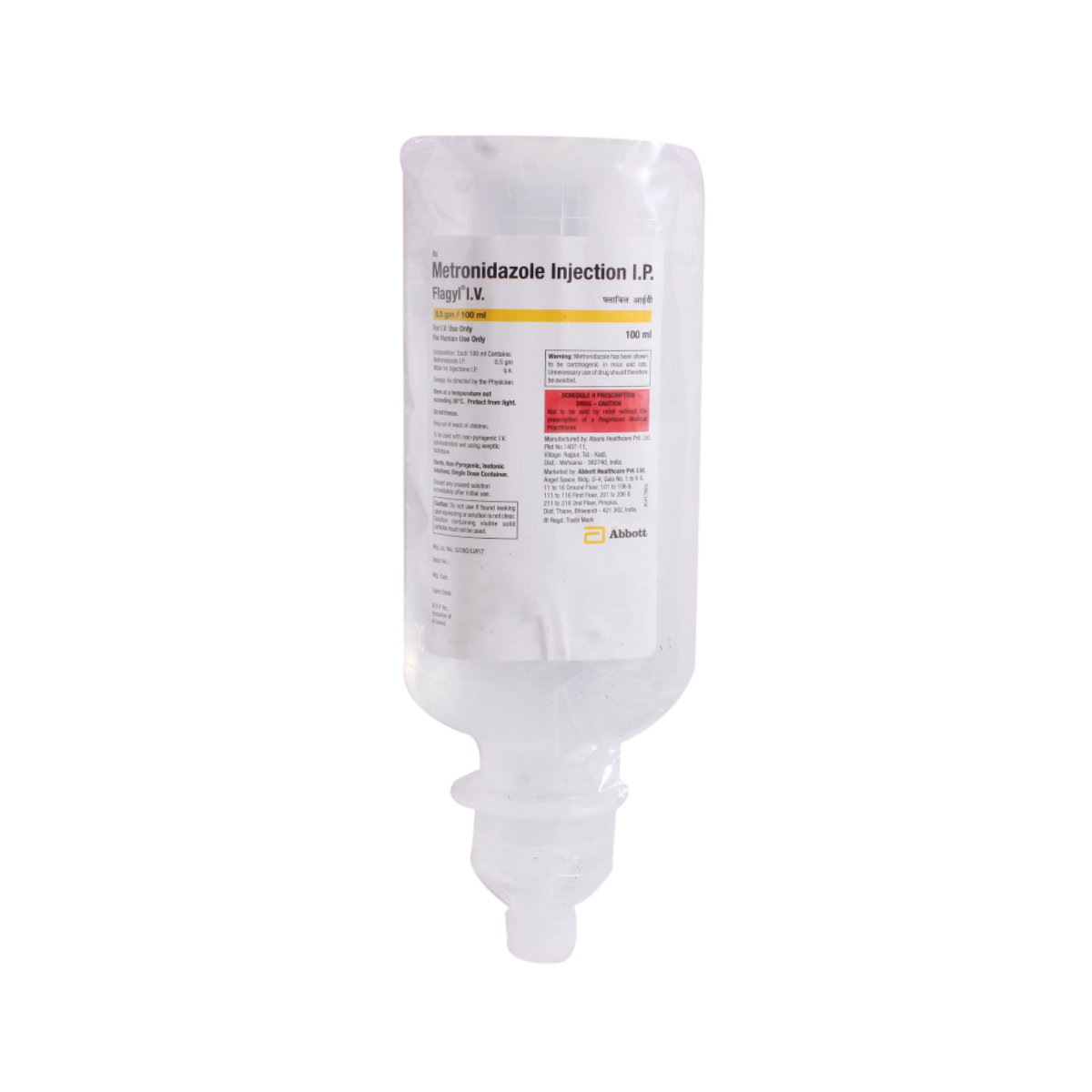Flagyl IV 500 mg Injection


MRP ₹22
(Inclusive of all Taxes)
₹3.3 Cashback (15%)
know your delivery time
Provide Delivery Location
Composition :
Manufacturer/Marketer :
Consume Type :
Expires on or after :
Return Policy :
NPPA :

Secure Payment

Trusted by 8 Crore Indians

Genuine Products
Therapeutic Class
Country of origin
Manufacturer/Marketer address
Author Details
We provide you with authentic, trustworthy and relevant information
Disclaimer
Alcohol
Safe if prescribed
You are recommended not to consume alcohol along with Flagyl IV 500 mg Injection to avoid unpleasant side effects such as stomach pain, nausea, vomiting, flushing, and headache.
Pregnancy
Consult your doctor
Please consult your doctor. Flagyl IV 500 mg Injection should be used in pregnant women only if clinically needed, and the benefits outweigh the risks.
Breast Feeding
Consult your doctor
Consult your doctor if you are a nursing mother. Your doctor will weigh the benefits and potential risks before prescribing Flagyl IV 500 mg Injection .
Driving
Safe if prescribed
Flagyl IV 500 mg Injection may cause dizziness and drowsiness; thus, avoid operating machinery or driving vehicles unless you are alert.
Liver
Consult your doctor
Flagyl IV 500 mg Injection to be taken with caution, especially if you have a history of liver diseases/conditions. Your doctor may adjust your dose depending upon your liver condition.
Kidney
Consult your doctor
Flagyl IV 500 mg Injection to be taken with extreme caution, especially if you have a history of kidney diseases/conditions. Your doctor may adjust your dose depending upon your kidney condition.
Children
Safe if prescribed
Limited information about the use of Flagyl IV 500 mg Injection in paediatric patients. Please seek medical advice. Your doctor will weigh the benefits and risks before prescribing this medicine to your child.
Product Substitutes
Reference
- https://dailymed.nlm.nih.gov/dailymed/fda/fdaDrugXsl.cfm?setid=d46870f5-e2b1-46bd-8413-4a0a8bcf3175&type=display
- https://www.medicines.org.uk/emc/files/pil.13293.pdf
- https://www.medicines.org.uk/emc/product/1842/smpc#gref
- https://www.nhs.uk/medicines/metronidazole/about-metronidazole/
- https://www.drugs.com/drug-interactions/metronidazole-index.html?filter=3
About Flagyl IV 500 mg Injection
Flagyl IV 500 mg Injection belongs to a group of medicines known as anti-bacterial agents used to treat severe bacterial infections of the bone, skin and skin structure, blood, joint, abdomen, central nervous system, respiratory, gynaecological infections, meningitis (infection of the membranes that surround the brain and spinal cord), and endocarditis (infection of the heart lining and valves).
Flagyl IV 500 mg Injection contains Metronidazole, which suppresses protein synthesis by interacting with DNA and causes helical DNA structure loss and strand breakage. As a result, it induces cell death in susceptible organisms. Thereby Flagyl IV 500 mg Injection treats bacterial infections.
Flagyl IV 500 mg Injection will be administered by a healthcare professional; do not self-administer. Some common side effects of Flagyl IV 500 mg Injection are nausea, vomiting, diarrhoea, constipation, and injection site reaction. These side effects are temporary and may get resolved after some time. However, if any of the side effects persist or worsen, contact the doctor.
Let your doctor know if you are allergic to metronidazole. Consult your doctor if you are pregnant, planning to get pregnant, or if you are breastfeeding. Do not operate heavy machinery or drive after taking Flagyl IV 500 mg Injection as it may cause dizziness and drowsiness. Avoid consumption of alcohol while on treatment with Flagyl IV 500 mg Injection as it may cause unpleasant side effects.
Uses of Flagyl IV 500 mg Injection
Medicinal Benefits Mweb
Key Benefits
Flagyl IV 500 mg Injection belongs to a group of medicines known as anti-bacterial agents used to treat severe bacterial infections of the bone, skin and skin structure, blood, joint, abdomen, central nervous system, gynecologic, respiratory infections, meningitis (infection of the membranes that surround the brain and spinal cord), and endocarditis (infection of the heart lining and valves). Flagyl IV 500 mg Injection contains Metronidazole, which suppresses protein synthesis by interacting with DNA and causes helical DNA structure loss and strand breakage. As a result, it induces cell death in susceptible organisms. Thereby Flagyl IV 500 mg Injection treats bacterial infections.
Directions for Use
Side Effects of Flagyl IV 500 mg Injection
- Nausea
- Vomiting
- Diarrhoea
- Constipation
- Injection site reactions
Drug Warnings
Do not take Flagyl IV 500 mg Injection if you are allergic to any of the components. Consult your doctor if you are pregnant, plan to get pregnant or if you are breastfeeding. Do not operate heavy machinery or drive after taking Flagyl IV 500 mg Injection as it may cause dizziness and drowsiness. Inform your doctor if you have bone marrow depression/low blood count, kidney impairment, CNS disorder, liver or heart problems, peripheral neuropathy, epilepsy, Crohn's disease (a condition in which the body attacks the lining of the digestive tract), yeast infection, oedema (swelling), or blood disorders.
Drug-Drug Interactions
Drug-Drug Interactions
Login/Sign Up
Co-administration of Amprenavir with Flagyl IV 500 mg Injection 100 ml can increase the risk or severity of side effects.
How to manage the interaction:
Taking Flagyl IV 500 mg Injection 100 ml with Amprenavir is generally avoided as it can result in an interaction, it can be taken if your doctor has advised it. However, if you experience throbbing in the head and neck, throbbing headache, difficulty breathing, nausea, vomiting, sweating, thirst, chest pain, rapid heartbeat, palpitation, low blood pressure, dizziness, lightheadedness, blurred vision, and confusion, contact a doctor immediately. Do not discontinue any medications without consulting a doctor.
Drinking alcohol while taking Flagyl IV 500 mg Injection 100 ml can increase the risk or severity of side effects.
How to manage the interaction:
Taking Flagyl IV 500 mg Injection 100 ml with Ethanol is avoided as it can result in an interaction, it can be taken if your doctor has advised it. However, if you experience flushing, throbbing in head and neck, throbbing headache, difficulty breathing, nausea, vomiting, sweating, thirst, chest pain, rapid heartbeat, palpitation, low blood pressure, dizziness, lightheadedness, blurred vision, and confusion, contact a doctor immediately. Do not discontinue any medications without consulting a doctor.
Coadministration of Disulfiram with Flagyl IV 500 mg Injection 100 ml can increase the risk of side effects.
How to manage the interaction:
Taking Flagyl IV 500 mg Injection 100 ml and Disulfiram together is generally avoided as it can lead to an interaction, it can be taken if advised by your doctor. However, if you experience sudden dizziness, confusion, weakness, shortness of breath, or palpitations, contact your doctor. Do not discontinue any medications without consulting a doctor.
Coadministration of Flagyl IV 500 mg Injection 100 ml with warfarin can increase the risk of bleeding.
How to manage the interaction:
There is a possible interaction between Flagyl IV 500 mg Injection 100 ml and warfarin, but they can be taken together if a doctor has prescribed them. Consult a doctor if experience unusual bleeding or bruising, vomiting, blood in your urine or stools, headache, dizziness, or weakness. Do not stop using any medications without talking to a doctor.
Coadministration of Busulfan and Flagyl IV 500 mg Injection 100 ml may increase the risk of side effects.
How to manage the interaction:
Taking Flagyl IV 500 mg Injection 100 ml and Busulfan together can result in an interaction, it can be taken if your doctor has advised it. However, if you experience unusual bruising or bleeding, fever, diarrhea, sore throat, muscle aches, shortness of breath, or burning during urination, contact a doctor immediately. Do not discontinue the medication without a doctor's advice.
Coadministration of Flagyl IV 500 mg Injection 100 ml with mebendazole may increase the risk or severity of side effects.
How to manage the interaction:
Although there is a possible interaction between Flagyl IV 500 mg Injection 100 ml and mebendazole, they can be taken together if your doctor has prescribed them. However, if you experience any unusual symptoms like fever, body ache, painful red rash, cough, peeling of the skin, or Drooling, contact a doctor immediately. Do not stop using any medications without talking to a doctor.
Co-administration of Fluconazole together with Flagyl IV 500 mg Injection 100 ml can increase the risk of an irregular heart rhythm.
How to manage the interaction:
-Taking Flagyl IV 500 mg Injection 100 ml with Fluconazole together can possibly result in an interaction, but it can be taken if a doctor has advised it. However, consult a doctor immediately if you experience any symptoms such as dizziness, lightheadedness, fainting, shortness of breath, or heart palpitations. Do not discontinue any medications without consulting a doctor.
Drug-Food Interactions
Drug-Food Interactions
Login/Sign Up
Drug-Diseases Interactions
Drug-Diseases Interactions
Login/Sign Up
Drug-Drug Interactions Checker List
- AMPRENAVIR
- ANISINDIONE
- DICUMAROL
- WARFARIN
- BCG VACCINE
- CHOLERA VACCINE LIVE
- TYPHOID VACCINE LIVE
- BUSULFAN
- DISULFIRAM
Habit Forming
Diet & Lifestyle Advise
- It would be best to take probiotics after taking the full course of Flagyl IV 500 mg Injection to restore healthy bacteria in the intestine that may have been killed. Taking probiotics after antibiotic treatment can reduce the risk of antibiotic-associated diarrhoea. Certain fermented foods like yoghurt, cheese, sauerkraut and kimchi can help restore the intestine's good bacteria.
- Include more fibre-enriched food in your diet, as it can be easily digested by gut bacteria which helps stimulate their growth. Whole grains like whole-grain bread, and brown rice, should be included in the diet.
- Avoid intake of alcoholic beverages with Flagyl IV 500 mg Injection as it can make you dehydrated and affect your sleep. This can make it harder for your body to aid Flagyl IV 500 mg Injection in fighting off infections.
All Substitutes & Brand Comparisons
RX
Out of StockMetronidazole Injection 100ml
B Braun Melsungen AG
₹12
(₹0.11/ 1ml)
45% CHEAPERRX
Out of StockMetris Injection 100 ml
Claris Lifesciences Ltd
₹13.6
(₹0.12/ 1ml)
40% CHEAPERRX
Fresogyl Injection 100 ml
Fresenius Kabi India Pvt Ltd
₹22
(₹0.2/ 1ml)
Buy best Infections & Infestation products by
Cipla Ltd
Macleods Pharmaceuticals Ltd
Alkem Laboratories Ltd
Lupin Ltd
Abbott India Ltd
Sun Pharmaceutical Industries Ltd
Mankind Pharma Pvt Ltd
Micro Labs Ltd
Aristo Pharmaceuticals Pvt Ltd
FDC Ltd
Intas Pharmaceuticals Ltd
Glenmark Pharmaceuticals Ltd
Ipca Laboratories Ltd
Torrent Pharmaceuticals Ltd
Zydus Healthcare Ltd
Biochem Pharmaceutical Industries Ltd
Zuventus Healthcare Ltd
United Biotech Pvt Ltd
Hetero Drugs Ltd
Emcure Pharmaceuticals Ltd
Alembic Pharmaceuticals Ltd
Indoco Remedies Ltd
Fusion Health Care Pvt Ltd
Dr Reddy's Laboratories Ltd
Leeford Healthcare Ltd
Cadila Healthcare Ltd
Wockhardt Ltd
Zydus Cadila
GlaxoSmithKline Pharmaceuticals Ltd
Morepen Laboratories Ltd
Blue Cross Laboratories Pvt Ltd
Cadila Pharmaceuticals Ltd
Converge Biotech Pvt Ltd
Elder Pharmaceuticals Ltd
Hetero Healthcare Pvt Ltd
Pfizer Ltd
AAA Pharma Trade Pvt Ltd
Gufic Bioscience Ltd
Mylan Pharmaceuticals Pvt Ltd
Corona Remedies Pvt Ltd
Wallace Pharmaceuticals Pvt Ltd
Apex Laboratories Pvt Ltd
Medishri Healthcare Pvt Ltd
Akumentis Healthcare Ltd
Alniche Life Sciences Pvt Ltd
Hegde & Hegde Pharmaceutica Llp
Veritaz Healthcare Ltd
Ranbaxy Laboratories Ltd
Koye Pharmaceuticals Pvt Ltd
Shreya Life Sciences Pvt Ltd
Overseas Health Care Pvt Ltd
Biocon Ltd
Indchemie Health Specialities Pvt Ltd
Medley Pharmaceuticals Ltd
Brinton Pharmaceuticals Ltd
J B Chemicals & Pharmaceuticals Ltd
Unifaith Biotech Pvt Ltd
Ajanta Pharma Ltd
Biochemix Health Care Pvt Ltd
Natco Pharma Ltd
Samarth Life Sciences Pvt Ltd
Unichem International
Laborate Pharmaceuticals India Ltd
Unipark Biotech Pvt Ltd
Zymes Bioscience Pvt Ltd
Indiabulls Pharmaceuticals Pvt Ltd
Neon Laboratories Ltd
Vasu Organics Pvt Ltd
DR Johns Lab Pharma Pvt Ltd
East West Pharma India Pvt Ltd
La Renon Healthcare Pvt Ltd
Medgen Drugs And Laboratories Pvt Ltd
Novartis India Ltd
Canixa Life Sciences Pvt Ltd
Icarus Health Care Pvt Ltd
Lincoln Pharmaceuticals Ltd
Celon Laboratories Pvt Ltd
Concept Pharmaceuticals Ltd
Klm Laboratories Pvt Ltd
Nicholas Piramal India Ltd
Systopic Laboratories Pvt Ltd
Yuventis Pharmaceuticals
Capital Pharma
German Remedies Ltd
Pristine Pearl Pharma Pvt Ltd
Unison Pharmaceuticals Pvt Ltd
Aurz Pharmaceutical Pvt Ltd
Clover Health Care Pharma
Kepler Healthcare Pvt Ltd
Allites Life Sciences Pvt Ltd
Auspharma Pvt Ltd
Intra Life Pvt Ltd
Jolly Healthcare
Linux Laboratories Pvt Ltd
Ozone Pharmaceuticals Ltd
Cachet Pharmaceuticals Pvt Ltd
Comed Chemicals Ltd
Delcure Life Sciences Ltd
Fresenius Kabi India Pvt Ltd
Khandelwal Laboratories Pvt Ltd
Frequently Bought Together


_0.jpg?tr=q-85)






